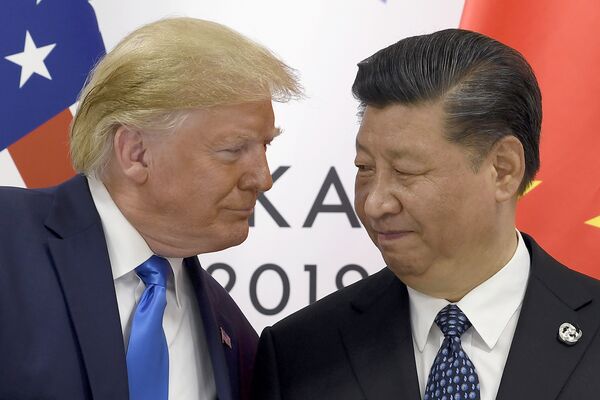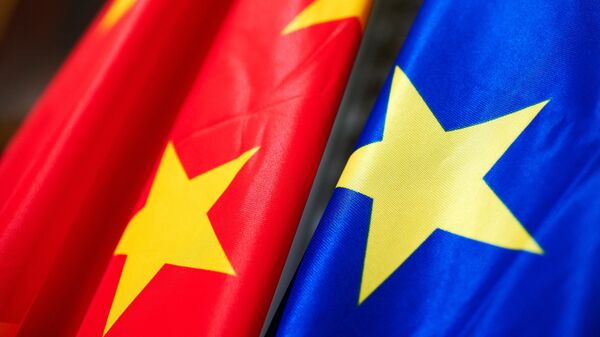Rector of the European University Cyprus, Kostas Gouliamos, takes a look at the latest steps taken by Washington towards Beijing and the role played by the European Union when it is caught in the middle of the US-China trade dispute.
Sputnik: Josep Borrell recently argued that “analysts have long talked about the end of an American-led system and the arrival of an Asian century. This is now happening in front of our eyes”. Would you agree with this assessment?
Kostas Gouliamos: Despite many demographic trends or pragmatic challenges and dilemmas that exist in Asia, there is a progressive growth in the region, following by the rise of digital technologies and “knowledge economy”. However, Asia’s share of the international economy remains 30%, despite the region being home to 60% of the world’s population. Under the present circumstances, only 15% of Asians are middle class.
In any case, the 21st century will be an “Asian Century” if the region continues to be the fastest-growing engine in the world economy. China, for instance, has become a sophisticated economic superpower. Moreover, there is an enormous potential for China to play a protagonist role in terms of trade, digital technology, foreign direct investments, renewable energy technology and military systems. And this has led many scholars, analysts and politicians - including the High Representative of the European Union for Foreign Affairs and Security Policy Mr Josep Borrell - to argue that this century will be the "Asian Century", following on from the preceding American-led system.
Sputnik: Certain steps by Washington have been condemned by Brussels, including the Trump administration’s imposition of national security tariffs on European goods and American withdrawal from both the Paris Climate Accord and the Iran nuclear agreement. To what extent can Europe strike a balance between securing its own interests and following US guidelines as its strategic ally?
Kostas Gouliamos: The US tensions with Europe are not new. As others have argued, the transatlantic relationship has always been complicated and riddled with disagreements. However, I would admit that Europe may not be central to US priorities anymore. There is strong evidence that the Euro-American relations are declining, particularly under the political management of president Trump. Indeed, his administration doesn’t consider any value in Washington’s political equilibrium with the EU. Washington has issued clashing positions and disagreements on everything, namely on the international system. Some may even be wondering if the US and the EU can jump-start a historical divorce process. Nevertheless, the EU seems to be more autonomous -in certain areas- from Washington’s hegemonic politics. Most importantly, there is an acceleration of cracks in the foundation of transatlantic relations, which will continue into the foreseeable future. Generally, the transatlantic disruptive relations are weakening both sides as Washington and Brussels compete in many levels with China and Russia. Beijing and Moscow know that transatlantic conflicts play well to their advantage.

Sputnik: Can the EU be a mediator between China and the US, amid resurgent Sino-American tensions?
Kostas Gouliamos: It seems that the US political administration has little interest in de-escalating its trade attack against Beijing. The policymakers of the US are determined to delay China’s ascendance as an economic and political protagonist in notable strategic sectors. In fact, the US aggressive action is highly likely to be lasting. On top of it, Washington’s aggressiveness puts considerable stress on the World Trade Organization and, consequently, it escalates tensions in key geopolitical areas. Moreover, US aggressive policy has become the central reason for tensions in international relations, with a different intensity from that of the Cold War era.
Within this context, the EU needs to position itself as a credible player. It must not fall into total inertia. Despite problematic differences in policies and bureaucratic politics, Brussels has the capacity to define a line of conciliation and act accordingly between or among the opposing forces in the global community.
Sputnik: A recent survey found that 76% of Germans said their view of the US had deteriorated because of the pandemic, compared with 36% who said the same of China. How would you assess this current sentiment among the European public towards the US?
Kostas Gouliamos: There are several studies which indicate that favourable views of the US remain at historic lows in many countries polled. In addition, more people - according to polls - believe that bilateral relations with the US have worsened rather than improved. For the vast majority of Europeans, American leadership has been weak. In addition, the communication formula for a coronavirus scapegoat orchestrated by Trump’s political management, made most Europeans lose their confidence in the US. In other words, they can not accept Washington’s COVID-19 blame game against China. Nevertheless, the looming presidential election has amplified the Trump’s ultra-nationalistic rhetoric and aggressive action.

Sputnik: Last year, the European Union published a strategic outlook paper in which it labelled China a “systemic rival” reflecting a sharp change in its balance of assumptions about Sino-European relations. How can EU-China relations be rebalanced? How will China be viewed from the European perspective - as a partner, rival, or somewhere in between?
Kostas Gouliamos: In an increasingly fractured global environment, Europeans should focus on forms of connectivity with China as this country continues to grow and prosper. A strong Sino-European partnership and connectivity is in the interests of both the EU and China. As China’s holistic growth shapes and shakes the domains of world affairs, the EU must design and execute a robust strategic partnership with China. The EU and China have 45 years of formal diplomatic ties. Since then, there is tremendous partnership progress, including an annual summit, regular ministerial meetings, and over 60 sectoral discussions. In view of this, Europe's approach towards China must be completely pragmatic. Brussels must steadily extend robust interactions with Beijing based on joint development strategies and a strategically coherent approach. Europe and China are increasingly relying on each other to make their digital economies grow.
Sputnik: According to analysts, the Chinese market remains important to European companies. How will the economic ties between Europe and China develop, in your view? Will we see further cooperation, especially in the wake of the sharp stance Washington is pushing right now towards China?
Kostas Gouliamos: It is notable that trade in goods between the EU and China is worth well over €1.7 billion a day. The EU is China’s biggest trading partner while China is the EU’s second-largest trading partner. Additionally, China's total GDP is bigger than the US and the biggest in the world. In any case, Beijing’s interest in Europe is expanding into new areas. For instance, the “Belt and Road Initiative” is definitely a new venue that requires a new strategic approach. It offers Brussels a unique opportunity and the appropriate connectivity to work closer with China on a series of issues, ranging from the innovation ecosystem and technology to a reform of the WTO. Anyway, building on the “Belt and Road Initiative” societies simultaneously can help in building stability and peace in the 21st century. In the meantime, as China is becoming a political and economic force in world affairs as well as a world innovator in technology, the EU member-states should avoid their intra-competition and concentrate on the implementation of a common ground partnership with China.
Similarly, a strategic partnership among China, Russia and the EU is necessary. Such a partnership has the capacity to reshape both Eurasia’s future in the 21st century and global governance. To a great extent, it is capable of forming a new geopolitical architecture.



